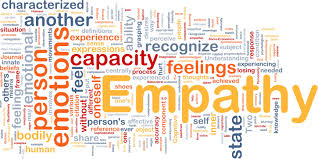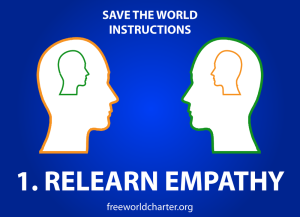The “Disaster Age” and Empathy
CONFLICT RESOLUTION - MEDIATION, 6 Jul 2015
Tedla D. Tekle – TRANSCEND Media Service
 Human civilisations and technological advancements have helped save our globe from serious tragedies. The Armageddon has been pushed back. Along with the fabulous human discoveries, leaps, and launches to the moon, though, our globe is grappling with threats that are endangering its advancements and journey.
Human civilisations and technological advancements have helped save our globe from serious tragedies. The Armageddon has been pushed back. Along with the fabulous human discoveries, leaps, and launches to the moon, though, our globe is grappling with threats that are endangering its advancements and journey.
From the cowardly acts of radicals, the insensitivity of right wings to and denigration of the other, displacement and migration, heat waves that kill hundreds to the intra and inter-country conflicts, the world is witnessing phenomenally unprecedented occurrences, most of which are still unpredictable. These crises are mutable, trans-boundary, multidimensional and complex. The alarming increase of the threats is elevating our level of fretfulness about the world that we are going to leave for our children.
It is legit to assume that the world is gradually transforming from the “Information Age” to the “Disaster Age” or we are living both ages simultaneously.
According to Professor Simon Cottle, the writer of Global Crisis Reporting, 2009, global crises today include climate change and ecological risks, disasters and humanitarian emergencies, war (cowardly violence on civilians), military humanism, threats from new generation weapons, poverty and related health risks, transnational pandemics, population rise and migration, human rights abuses and world trade and financial crises.
Cottle argues, “Global crises are both constituted by and constituting of a negatively inflected and enveloping globality.” The globality is felt in the trans-boundary nature of the crises as well as their ubiquity. Most developed countries at one point in time had experienced most of the crises that the developing world is facing today such as large-scale emigration, conflicts, extreme poverty, and natural disasters. These crises needed the human agency and commitment not to let it happen again and many of today’s stable and prosperous countries individually and collectively have achieved them. Learning from the past, these better-off nations are helping the majority world financially, welcoming the strangers, and sharing their experiences, but all of us are facing some of the crises equally.
Yet, the achievements have always been threatened even enormously in a globalised world. The benefits and fruits of globalisation are not only the successes and the benign. The hardships, the pains, the problems, and even the cruelty of the ‘other’, are shared. When the goods or the hardships of the other are overly interfered or neglectfully avoided, the disasters double. Since genuinely humanitarian or not, interventions do not always mean success. The sorrowing headlines we read every day from the North to the South, from the East to the West are thus results of perhaps our humanitarian inactions or over-actions.
One fact is nonetheless noticeable. As much as the concern and the effort to deal with the humanitarian tragedies are increasing, the lack of interest or sympathy to the ‘other’ is gradually decreasing. Is this happening due to the economic inequality and hardships that many people are finding themselves in or due to our desensitisation to human suffering? I am cognizant of the depth, vastness, and complexity of the subject and therefore, it cannot be dealt with in one shot. Humanitarianism is becoming more and more mainstream, political and more and more a sector and an industry in its own right, the analyses, and solutions to it are also taking multifaceted perspective as in the organisation of high level international humanitarian summits and the creation humanitarianism orientated academic disciplines.
Appreciating all the encouraging efforts and initiatives to mitigate global crises such as humanitarian action, innovation and funding or reshaping of aid, I argue that a fundamental and foundational concept in all humanitarian activities is often swept under the carpet. It is the building block, the structure and the goal of any and every humanitarian action.
This concept or theory which has been missing in humanitarian policy, documents, programs, or discourses, is the natural disposition that a would-be humanitarian worker or agency should possess. Frans deWaal defines empathy as the capacity to (a) be affected by and share the emotional state of another, (b) assess the reasons for the other’s state, and (c) identify with the other, adopting his or her perspective. In “The Science of Evil,” Simon Baron-Cohen states, “empathy occurs when we suspend our single—minded focus of attention and instead adopt a double-minded focus of attention.” A double-minded focus is not as simple as an intuitively judging or a generalising focus but is doable.
Without having or developing empathy, it might be difficult to initiate genuine programs and achieve effective outcomes in the humanitarian sector especially. When we are emphatic, our neurons or outlooks of the world but mainly crises will be based on our own internal and unbiased analysis and judgement of the actual crises rather than being suppressed and stereotyped by what is drawn, framed, or constructed for us externally by the press, elites, political parties, religions, humanitarians or the ‘inhumane humanitarians.’
Where have the empathies of those that kill countless innocent people in broad day light, the empathies of mother earth, the empathies of the power holders, and the empathies of the victims left for? Why would we also jump to humanitarian action before synthesising empathy? Can we achieve our goals without knowing what we are doing and why we are doing it? We may not prevent, mitigate, or solve global crises by solely deconstructing them as invasions, security concerns, or problems of a shared humanity.
Let us evoke and divulge our inborn empathies before or together with our needs, interests, securities, and self-indulgences, if that is possible. It is observed that empathy is high among homogenous rather than intercultural communities but other researchers like Robin M. Keillor in a 2014 study on “Cross-Cultural Relationship Building,” find that empathy training increases relational empathy. Why cannot humanitarian organisations and private companies make training in empathy a mandatory aspect of their corporate responsibility? In addition, before we wait for the mainstreaming of empathy, why do not we individually conduct introspection and find out if we truly are empathic?
Let us sleep on the take away from this short piece; empathy – the super word for crises reduction and resolution! It is probably one of the few experiences, finances, resources, knowledge and qualities that all of us as human beings have.
_______________________________
Tedla D. Tekle is a journalist and a researcher currently focusing on the media, conflict and peace. He can be reached at kinwttw@gmail.com“.
This article originally appeared on Transcend Media Service (TMS) on 6 Jul 2015.
Anticopyright: Editorials and articles originated on TMS may be freely reprinted, disseminated, translated and used as background material, provided an acknowledgement and link to the source, TMS: The “Disaster Age” and Empathy, is included. Thank you.
If you enjoyed this article, please donate to TMS to join the growing list of TMS Supporters.

This work is licensed under a CC BY-NC 4.0 License.
4 Responses to “The “Disaster Age” and Empathy”
Read more
Click here to go to the current weekly digest or pick another article:
CONFLICT RESOLUTION - MEDIATION:

You hit the right note there. Empathy has been hijacked but empathy cannot surface amid greed and capitalism. Although you do get there, you have not amicably elaborated on the how to part. How can empathy solve all these – it is missing in your report. `10q
[…] Source: https://www.transcend.org/tms/2015/07/the-disaster-age-and-empathy/comment-page-1/#comment-82923 […]
[…] Appreciating all the encouraging efforts and initiatives to mitigate global crises, I argue that a fundamental and foundational concept in all humanitarian activities is often swept under the carpet. It is the building block, the structure and the goal of any and every humanitarian action.It is called empathy. This concept or theory which has been missing in humanitarian policy, documents, programs, or discourses, is the natural disposition that a would-be humanitarian worker or agency should possess.Frans deWaal defines empathy as the capacity to(a) be affected by and share the emotional state of another,(b) assess the reasons for the other’s state, and(c) identify with the other, adopting his or her perspectiveIn “The Science of Evil,” Simon Baron-Cohen states, “empathy occurs when we suspend our single—minded focus of attention and instead adopt a double-minded focus of attention.”A double-minded focus is not as simple as an intuitively judging or a generalising focus but is doable.Tedla D. Tekle . […]
Thanks for sharing. A nice read and keep it up.